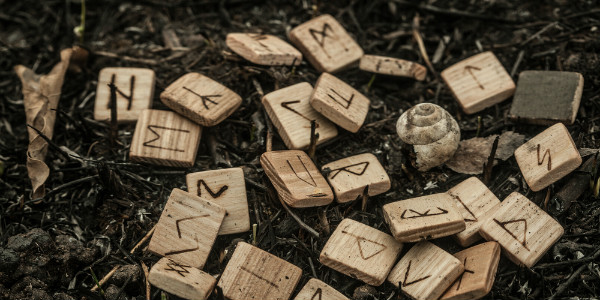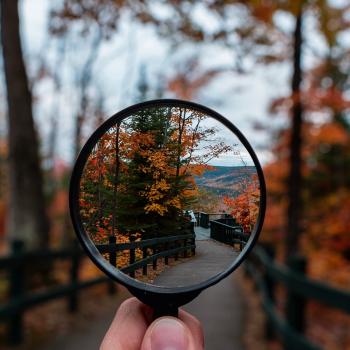Once a month I take a brief subway ride downtown to a large Episcopal church with an old-fashioned composition notebook in hand. On the cover of my notebook I have drawn a small compass, with arrows pointing to four directions. A sticker I received from a fundraising appeal-Think Wide Open-also graces the cover. These things remind me of the purpose of the notebook and my appointment- spiritual direction- a practice with a long history.

In the past, spiritual direction took the form of confession, the practice of seeking absolution and performing penance in order to stay in state of grace with God. Overtime, confession became a necessary part of receiving the sacrament of Holy Communion, the most central ritual of the Catholic Church. Speaking to a confessor- who in some senses is a spiritual director- is essential in the spiritual lives of Catholics.
Such concepts seem alien from the perch of Unitarian Universalism or earth-centered practice. Though time-honored rituals exist in our liberal faith, they are not essential to it, nor is the process of receiving guidance and direction institutionalized in any way. Instead, we draw strength from the grace that is given freely between individuals in communion with each other, leaving each person to navigate their own notion of divinity, whether they are theist or non-theist in orientation.
So why have a spiritual director? Is that the same as therapy?
Modern spiritual direction is not therapy, and it is lot more than confession, although I do confess things from time to time! Instead, spiritual direction is an opportunity for me not to see not just the road ahead, but to stop and make sure I take in the panoramic view around me. The insights gained need not be earth-shattering or cloud opening. Just speaking out loud to another individual often results, bit by bit, into valuable building blocks. Moreover, a spiritual director need not be part of your faith to be a good resource for you, as I have found with my Episcopal priest.
Most recently, I have been talking about my feelings around my next vocational transition- moving to Ohio this fall to take up my full-year ministerial internship at The First Unitarian Society of Cleveland. I had been utilizing the “empty the mind and just be present” mode of meditation, but, without access to a meditation teacher, that has worked on normal, day-to-day anxiety levels, but not much more. Under my spiritual director’s guidance, I used guided meditation at home and discovered that the Welsh goddess Cerridwen was poking at my subconscious. I told my director Cerridwen’s stories, and as I spoke we both recognized that as a goddess who had mastered shape-shifting, she was an appropriate as an inner guide for any transitional period. No doubt as I probe deeper in this direction I will discover even more.
Most people who seek the advice of spiritual directors are likely to be religious professionals, because the demands of their vocation naturally places them in a position to have doubts about their spiritual beliefs. But many receive spiritual direction without knowing it!
When thinking about both ancient and modern models of spiritual direction within neo-Pagan or earth-centered beliefs, two main figures come to mind- the oracle and diviner. Oracular practice, in which an individual is said to receive messages from the divine (often in response to specific questions), has some of the characteristics of spiritual direction. Whether the priest/priestess actually assumes the deity while speaking or travels in a shamanic fashion to receive images and then transmit them, the goal is often the same.

In the ancient literature, such oracles are more often consulted for monumental decisions such as the movement of armies or the destiny of princes, but I like to think that on an average day, they were consulted on other topics. Certainly, in many, if not all, earth-centered traditions such as Wicca or the more re-constructionist Pagan traditions, we have the oracular traditions. Seidr is one practice that comes to mind. Such practices tend to be very taxing on the oracle, however, and cannot be sustained, for the most part, as regularly as is it is typically called for in an ongoing spiritual-direction relationship.
Another practice, divination by sortilege, (random lots) such as with Tarot, Runes, Ogham, or other methods can also become spiritual direction. Regardless of what you believe about the predictive power of such systems, they contain a wealth of imagery that once accessed, can help an individual understand what issues about belief and faith lie buried in an individual. Particularly Tarot, with its images originating in Renaissance Italy and its current permutation into thousands of formats, contains a heady language which stimulates the psyche and draws out our fears, anxieties, and joys.
There are so many good reasons to seek spiritual direction- whether you are a theist or a non-theist, a spiritual director can help you inventory your resources and assist you in finding your own personal “Swiss army knife” – your tool kit for living.

















